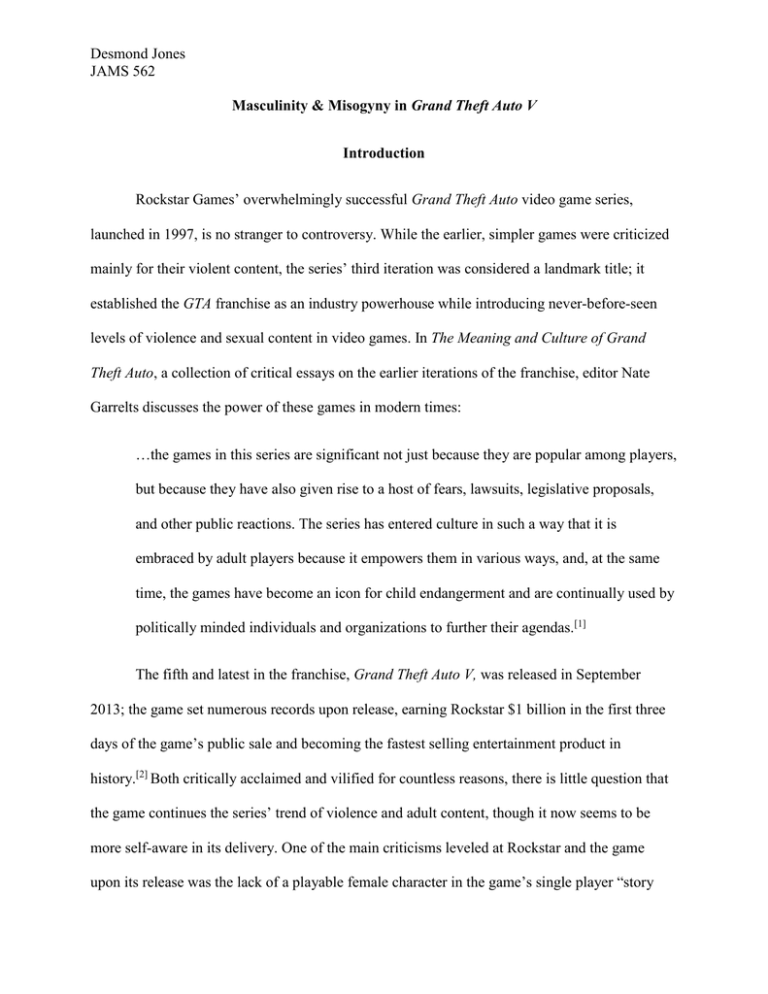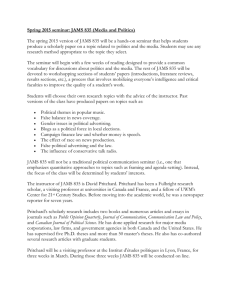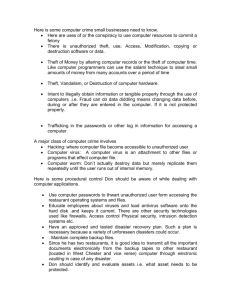Masculinity & Misogyny in Grand Theft Auto V Essay
advertisement

Desmond Jones JAMS 562 Masculinity & Misogyny in Grand Theft Auto V Introduction Rockstar Games’ overwhelmingly successful Grand Theft Auto video game series, launched in 1997, is no stranger to controversy. While the earlier, simpler games were criticized mainly for their violent content, the series’ third iteration was considered a landmark title; it established the GTA franchise as an industry powerhouse while introducing never-before-seen levels of violence and sexual content in video games. In The Meaning and Culture of Grand Theft Auto, a collection of critical essays on the earlier iterations of the franchise, editor Nate Garrelts discusses the power of these games in modern times: …the games in this series are significant not just because they are popular among players, but because they have also given rise to a host of fears, lawsuits, legislative proposals, and other public reactions. The series has entered culture in such a way that it is embraced by adult players because it empowers them in various ways, and, at the same time, the games have become an icon for child endangerment and are continually used by politically minded individuals and organizations to further their agendas.[1] The fifth and latest in the franchise, Grand Theft Auto V, was released in September 2013; the game set numerous records upon release, earning Rockstar $1 billion in the first three days of the game’s public sale and becoming the fastest selling entertainment product in history.[2] Both critically acclaimed and vilified for countless reasons, there is little question that the game continues the series’ trend of violence and adult content, though it now seems to be more self-aware in its delivery. One of the main criticisms leveled at Rockstar and the game upon its release was the lack of a playable female character in the game’s single player “story Desmond Jones JAMS 562 mode,” in lieu of three male characters. Dan Houser, lead writer for the series, has publicly defended the game’s masculine viewpoint as a necessity: The concept of being masculine was so key to this story…having three protagonists allows us to create nuanced stories, not a set of archetypes. Rather than seeming like you've got this super-criminal who can do everything effortlessly, they're all good and bad at different things. We liked the idea of a protagonist retiring with a family, and how awful that would be. We've never done anything like that and you don't really see it in games - to feed into these concepts of parenting and pseudo-parenting.[3] Virtually all reviewers agreed that the game’s story was well-written and captivating, but many argued that Rockstar could easily have easily created a female main character for the game and told the same story; many reviewers, including Gamespot’s Carolyn Petit, found that the game to be particularly misogynistic aside from the game’s choice of playable characters: GTA V has little room for women except to portray them as strippers, prostitutes, longsuffering wives, humorless girlfriends and goofy, new-age feminists we’re meant to laugh at. Characters constantly spout lines that glorify male sexuality while demeaning women, and the billboards and radio stations of the world reinforce this misogyny, with ads that equate manhood with sleek sports cars while encouraging women to purchase a fragrance that will make them ‘smell like a bitch.’ Yes, these are exaggerations of misogynistic undercurrents in our own society, but not satirical ones. With nothing in the narrative to underscore how insane and wrong this is, all the game does is reinforce and celebrate sexism.[4] Desmond Jones JAMS 562 Petit, a trans woman, still gave the game a 9/10 review and otherwise had nothing but praise for the game. Despite this, she faced considerable backlash ranging from 20,000 comments on her initial review, to a Change.org petition to have her fired and vicious transphobic threats from various other sources.[2][5] While most agree that the backlash Petit faced was inexcusable, her comments on the game’s representation of women and the subsequent response sparked a larger dialog about GTAV’s treatment of gender that has seen many either defend or condemn the game’s content. Defenders of GTAV often claim that the game’s setting is supposed to be nothing more than a satirical take on reality; an oft-used defense is the fact that almost all of the non-playable characters are crappy people, whether they are male or female: Take Jimmy De Santa, Michael’s son who does nothing but play videogames all day and mooch off his father. Or the eventual villains of the game, rich billionaire douchebag Devin and FIB douchebag Steven, corrupted by money and power. In short, neither gender comes off terribly well in Rockstar’s San Andreas. This is a universe of stereotypes and very bad people.[6] Grand Theft Auto V is unapologetically misanthropic, if nothing else; virtually all of the characters are reprehensible people, regardless of gender. However, Rockstar’s choice of three male leads allows them to contextualize the game’s universe as a larger satire of masculinity, while the relegation of women to one-dimensional supporting roles is significantly more misogynistic than satirical in nature. GTAV’s approach to gender representation normalizes discrimination against women by painting them as deserving in a number of ways; this not only prevents many women from enjoying the game, but could reinforce negative stereotypes in the eyes of some players. Desmond Jones JAMS 562 Dynamic portrayals of masculinity It must be noted that for all its flaws, GTAV is indeed very progressive when it wants to be. The game paints a surprisingly nuanced portrait of the hollow nature of the hegemonic masculine ideal through its three main characters; Michael, Franklin and Trevor are all sociopathic mass murderers, but through the player’s experiences, they are also given the opportunity to become well-rounded and likeable characters. Michael, a washed-up high-school football star, is a retired bank robber who seems to be living an idyllic mansion life in witness protection. Despite his lavish lifestyle and attempts to provide for his family in every way possible, they resent him and it is heartbreaking to watch Michael attempt to keep them together as he struggles to escape his past demons. Franklin, a young man of color, grew up in a household full of drugs and abuse, was expelled from high school for assault, and served time in prison after a brief life of petty crime. After his release, Franklin resolves to leave his old life in the ghetto behind, but falls back into a life of crime and struggles to balance his desire to be successful with his feelings of selling out by leaving his past behind. Trevor is a brilliant but violent sociopath who has struggled with society’s lack of acceptance. Trevor is uneducated and barely literate, dogged by poverty and mental illness but is shown to be incredibly intelligent while being neither racist nor misogynistic; in fact he treats women with more respect than anyone else in the game. The game also does little to glorify the activities that its main characters participate in; while these men are living the hegemonic masculine dream full of violence, sleek sports cars and beautiful women, they are all portrayed as fundamentally unhappy people struggling to find their place in the world.[7] Taken wholly, there are some aspects of king comedies in GTAV’s portrayal of masculinity; its hyper-violent nature is fundamentally a parody of masculinity, allowing its playable characters to commit mass Desmond Jones JAMS 562 violence so casually that it is simultaneously hilarious and terrifying, consistent with Judith Halberstam’s interpretation of kinging: “Whereas camp reads dominant culture at a slant and mimics dominant forms of femininity in order to produce and ratify alternative drag femininities that revel in irony, sarcasm, inversion and insult, kinging reads dominant male masculinity and explodes its effects through exaggeration, parody and earnest mimicry.”[8] Disparaging portrayals of femininity Despite GTAV’s kindness to men, though, it is almost nothing but disparaging to women. While the game’s narrative is indeed surprisingly progressive in its approach to many topics, feminism is not one of them. Largely because the game’s plot revolves around a deconstruction of masculinity, women are not given the same agency. Some of GTAV’s more prominent female representations include: • Michael’s wife Amanda, an ex-stripper who cheats on him off-screen and literally does nothing but scream at him on-screen • Tracey, Michael’s proudly “tramp-stamped” daughter whose only obsession is becoming a reality TV star • Franklin’s aunt, who power-walks with other middle-aged women while chanting “I am woman, hear me roar!” • Tonya, a drug addict who offers Franklin sex in exchange for favors (Franklin declines) • Mary-Ann, a psychotic fitness addict who constantly laments being 39 and childless to the player[6][7] Desmond Jones JAMS 562 These characters only scratch the surface of GTAV’s misogyny. Players can go to a strip club, pay for a lap dance, and participate in a mini-game where the player must touch and grope the stripper without getting caught by the bouncer; if the player is good enough a bonus sex scene is unlocked.[9] Non-playable characters spout sexist one-liners about being obsessed with men, stomach staplings, sexual deviance and other ridiculous topics.[7] These representations are hard to take seriously, but it is difficult to call them satire; GTAV’s writers seem to have crossed the line from a satire of feminism into what Anita Sarkeesian calls ironic sexism: Sometimes this type of self-referential humor is referred to as ironic sexism. It’s the ‘I know that you know that I know this is sexist,’ wherein the underlying assumption on the part of media makers seems to be that as long as the sexism is overt, obvious, or over the top, then it somehow loses its cultural power and is suddenly no longer a problem. Ironic sexism is dependent upon the false assumption that people no longer really hold retrograde sexist beliefs, and therefore the very idea of sexism is now just a hilarious joke.[10] Certainly, many of the game’s minor male characters are portrayed in a similarly ridiculous light. Through the game’s three main characters, however, men are given considerable agency and an incredible portrait of diversity is painted between Michael’s abject upper-class misery, Trevor’s simple trailer park life and Franklin’s attempts to leave the ghetto behind. These struggles add significant humanity to the otherwise reprehensible main characters, making a puzzlingly progressive yet sexist assertion: that men can come from all walks of life and face different struggles in the quest for happiness, which might not be the hegemonic masculine ideal, while women are bitchy, worthless scenery no matter what the context. Desmond Jones JAMS 562 Since what Memmi calls the “mark of the plural” projects colonized people as “all the same,” any negative behavior by any member of the oppressed community is instantly generalized as typical, as pointing to a perpetual backsliding toward some presumed negative essence. Representations thus become allegorical; within hegemonic discourse every subaltern performer/role is seen as synecdochially summing up a vast but putatively homogeneous community. Representations of dominant groups, on the other hand, are seen not as allegorical but as “naturally” diverse, examples of the ungeneralizable variety of life itself.[11] GTAV can be said to nearly explicitly commit the crime of representation that Shohat and Stam discuss. Women, as the colonized, are summed up as one-dimensional props, existing as vain annoyances regardless of the specific interpretation. Even GTAV’s lone positive representation of a woman is contextualized in a sexist manner. Arguably the game’s only positive portrayal is a non-playable character named Taliana, who can be hired as a driver for a handful of the game’s “heist” missions. Taliana is shown to be one of the most skilled drivers available to the player, yet she asks for the lowest pay out of all the player’s options; through character dialogue in the narrative, this circumstance is painted as being advantageous to the player, since Taliana’s progress doesn’t count.[7][12] It’s difficult to tell what Rockstar’s intent was by including this confusing bit of “social commentary,” which barely highlights the reality that many talented women are totally underpaid, with full-time working women earning only 77% of what males earn, according to a 2014 Pew Research study.[13] Desmond Jones JAMS 562 Lost on the audience? Another question that has arisen from the controversy surrounding GTAV is that if it is really satire, does its target audience see it as such? GTAV’s embrace of ironic sexism and portrayal of feminists as goofy and laughable would seem to imply that Rockstar takes a postfeminist view of the world, one that is likely shared by the majority of the game’s players. Sarah Banet-Weiser characterizes the contemporary postfeminist generation as having “a finely honed sense of irony…in other words, the cynicism of the current generation is not only directed toward consumer culture but also toward historical political formations such as feminism.”[14] This belief discredits the view that GTAV needs to provide better representations, implying that historical struggles for enfranchisement were crucial at the time but are no longer necessary in the current media landscape. Telegraph writer Tom Hoggins wondered if Rockstar was trying to push players towards uncomfortable actions in order to make a larger point, while asking if most of GTAV’s players understood their intent: “…perhaps the great tragedy of GTAV is that too much of its audience is comfortable with it. The satirical barbs at its target demographic are too heavy-handed, the industry too much in its adolescence, which leads too many of its male players to revel in its frat-boy humour, rather than feel repelled by it.”[2] Discussing the aforementioned stripper groping mini-game, Edward Smith wrote that “this kind of behaviour violates people's rights. It marginalises women in their personal and professional lives. In some cases, it leads to rape. But Grand Theft Auto 5 doesn't care because it's a video game for boys. And boys will be boys.”[9] This normalization of sexist discrimination is alarming, especially considering the kinds of people that have access to the game. Indeed, many players who use the game’s online mode report regular interaction with children who would seemingly be far too young to purchase the M-rated game for themselves. In a guest editorial for Kotaku, one staff Desmond Jones JAMS 562 member at a game retailer reported being shocked at the number of parents who purchased GTAV for their children despite being aware of its content: Last week my store sold over a thousand copies of GTA V, at least a hundred of which were sold to parents for children who could barely even see over my counter…when I recite the phrases from the ESRB ratings box on the back cover of an M-rated game and it just goes right over your head I feel the need to be more specific. So I mention things like a game having a first-person view of half-naked strippers or that the game has a mission that forces you to torture another human being. In response, I often hear things like, "Oh, it's for my older son" or "All his friends already have it." Then I wonder to myself how often the youngest child watches the “older son” playing and if “all his friends” were to jump off a cliff… I don't tell you these things because I don't like your parenting style. It is because, when I look at little Timmy there in my store, I can't help but picture him as the little boy sitting across the table from my daughter in her first grade class.[15] The content of GTAV is nothing but mature, without exception. The representations are muddled enough for adult players; children playing the game may totally fail to understand the game’s satirical aspects and see it as an endorsement of the kind of actions the player is able to participate in. While this is more the fault of weak parenting than the game itself, it is crucial to note that video games have dramatically increased in scope and realism since their inception, and parents need to be aware of the content portrayed in the games they give to their children. Desmond Jones JAMS 562 Conclusion Grand Theft Auto V might portray the majority of its secondary characters as terrible people, but the game lacks a crucial female counterpoint to defend the game’s portrayals as anything other than sexist. Because of its representations, women are not only discouraged from enjoying the game but discriminated against within it, normalizing their lack of inclusion. While GTAV is certainly a recent and highly visible example of misogyny in the gaming industry, it is far from the only one. 59% of the United States population plays video games, and nearly half of those players are female, but male-dominated storylines and character archetypes are the norm.[16] Even worse, many gamers do not want to recognize the problem. Jonathan McIntosh, a producer of the Tropes vs Women in Video Games web series, recently wrote a list of privileges men enjoy while gaming and discussed the dominant ideology: One particularly astounding theme I’ve noticed running through online discussions surrounding these incidents has been a consistent denial that there is any real problem with the way women are treated in gaming. Despite the abundance of evidence, I’ve seen many of my fellow male gamers, in comment thread after comment thread, dismiss the issue as "no big deal" and insist that everyone is essentially treated the same…it’s not all bad news though; as a result of the expanding discussion in and about gaming spaces, it’s been encouraging to see a small but growing number of male gamers who seem to genuinely want to understand the problem and be part of the solution.[16] While the industry certainly has some way to go, things are improving. The #1reasonwhy Twitter hashtag, which began trending in late 2012, emerged as a response to Kickstarter’s Luke Crane, who asked why there were so few “lady game creators.” Twitter generated countless Desmond Jones JAMS 562 responses; many women reported being afraid to speak up, receiving rejections of nonsexualized character designs, having their work ignored or dismissed, dealing with sexual harassment and many other issues, including the need to fight the mistaken assumption that women don’t play video games. Many men and women in the industry spoke out positively as well in support of the cause, launching the #1reasontobe hashtag in response.[17] Rhianna Pratchett, lead writer of the newest Tomb Raider game, weighed in on the potential of more openly incorporating women in the gaming industry: I don't think that many young women are aware of the potential job opportunities (be it in design, programming, art, writing etc.) or the routes in. Even as a young gamer I didn't really know anything about what went on behind the scenes. A lot more needs to be done to address this and start inspiring the next generation. This is something that both educational authorities and the games industry needs to address hand-in-hand.[17] While change might be in the winds, GTAV is nonetheless emblematic of the problems women face in the world of video games. The game is a stunning technical achievement and a deep work of fiction with a progressive approach toward many social issues, which only makes it more puzzling that it is so misogynistic. Since women can and do play video games, and since it would probably be more profitable if women were buying Grand Theft Auto games as much as men, it is difficult to understand why Rockstar would choose not to incorporate a female playable character. The choice of three male leads was far from necessary; why can’t Rockstar create a female criminal that is similarly sociopathic, yet funny and endearing? It would be a great opportunity to send up many tropes about women in video games and provide a compelling take on gender inequality in the modern world. Desmond Jones JAMS 562 Works Cited [1] Garrelts, Nate, ed. The Meaning and Culture of Grand Theft Auto: Critical Essays. Jefferson, NC: McFarland, 2006. Print. [2] Hoggins, Tom. "Grand Theft Auto V Is Designed Deliberately to Degrade Women." The Telegraph. Telegraph Media Group, 04 Oct. 2013. Web. 06 Apr. 2014. <http://www.telegraph.co.uk/women/womens-life/10355275/Grand-Theft-Auto-V-is-designeddeliberately-to-degrade-women.html>. [3] Hill, Matt. "Grand Theft Auto V: Meet Dan Houser, Architect of a Gaming Phenomenon." The Guardian. Guardian News and Media, 07 Sept. 2013. Web. 12 May 2014. <http://www.theguardian.com/technology/2013/sep/07/grand-theft-auto-dan-houser>. [4] Petit, Carolyn. "Grand Theft Auto V Review." GameSpot. GameSpot.com, 16 Sept. 2013. Web. 03 Apr. 2014. <http://www.gamespot.com/reviews/grand-theft-auto-v-review/19006414475/>. [5] Alexander, Mitch. "Grand Theft Auto V: Misogyny & Transphobia." GayGamer.net. GayGamer.net, 3 Oct. 2013. Web. 12 May 2014. <http://gaygamer.net/2013/10/grand-theft-autov-misogyny-transphobia/>. [6] Tassi, Paul. "On Gender And 'GTA 5'" Forbes. Forbes Magazine, 26 Sept. 2013. Web. 03 Apr. 2014. <http://www.forbes.com/sites/insertcoin/2013/09/26/on-gender-and-gta-5/>. [7] Grand Theft Auto V. Rockstar Games, 17 Sep 2013. Video Game. [8] Halberstam, Judith. "Oh Behave! Austin Powers and the Drag Kings." The Media Studies Reader. By Laurie Ouellette. New York: Routledge, 2013. 396. Print. Desmond Jones JAMS 562 [9] Smith, Edward. "GTA 5: We Should All Be Worried About GTA's Strip Clubs." International Business Times. International Business Times, 20 Sept. 2013. Web. 12 May 2014. <http://www.ibtimes.co.uk/gta-5-strip-clubs-worrying-507677>. [10] Damsel in Distress (Part 3) Tropes vs Women. Perf. Anita Sarkeesian. Feminist Frequency, 2013. Online Video. [11] Shohat, Ella and Stam, Robert. "The Struggle over Representation." The Media Studies Reader. By Laurie Ouellette. New York: Routledge, 2013. 208. Print. [12] Totilo, Stephen. "Grand Theft Auto V and Women." Kotaku. Kotaku, 18 Sept. 2013. Web. 06 Apr. 2014. <http://kotaku.com/grand-theft-auto-v-and-women-1344112808>. [13] Patten, Eileen. "On Equal Pay Day, Key Facts about the Gender Pay Gap." Pew Research Center. Pew Research Center, 8 Apr. 2014. Web. 12 May 2014. <http://www.pewresearch.org/fact-tank/2014/04/08/on-equal-pay-day-everything-you-need-toknow-about-the-gender-pay-gap/>. [14] Banet-Weiser, Sarah. "What’s Your Flava: Race and Postfeminism in Media Culture." The Media Studies Reader. By Laurie Ouellette. New York: Routledge, 2013. 379. Print. [15] "I Sold Too Many Copies of GTA V To Parents Who Didn't Give a Damn." Kotaku. Kotaku, 23 Sept. 2013. Web. 12 May 2014. <http://kotaku.com/i-sold-too-many-copies-of-gta-vto-parents-who-didnt-g-1371011511>. [16] Mullis, Steve. "Gaming While Male: A 'Privilege' Few Men Recognize." NPR. NPR, 27 Apr. 2014. Web. 12 May 2014. <http://www.npr.org/blogs/alltechconsidered/2014/04/27/306853264/gaming-while-male-a- Desmond Jones JAMS 562 privilege-few-menrecognize?utm_source=facebook.com&utm_medium=social&utm_campaign=npr&utm_term=n prnews&utm_content=20140427>. [17] Hamilton, Mary. "#1reasonwhy: The Hashtag That Exposed Games Industry Sexism." Theguardian.com. Guardian News and Media, 28 Nov. 2012. Web. 12 May 2014. <http://www.theguardian.com/technology/gamesblog/2012/nov/28/games-industry-sexism-ontwitter>.


